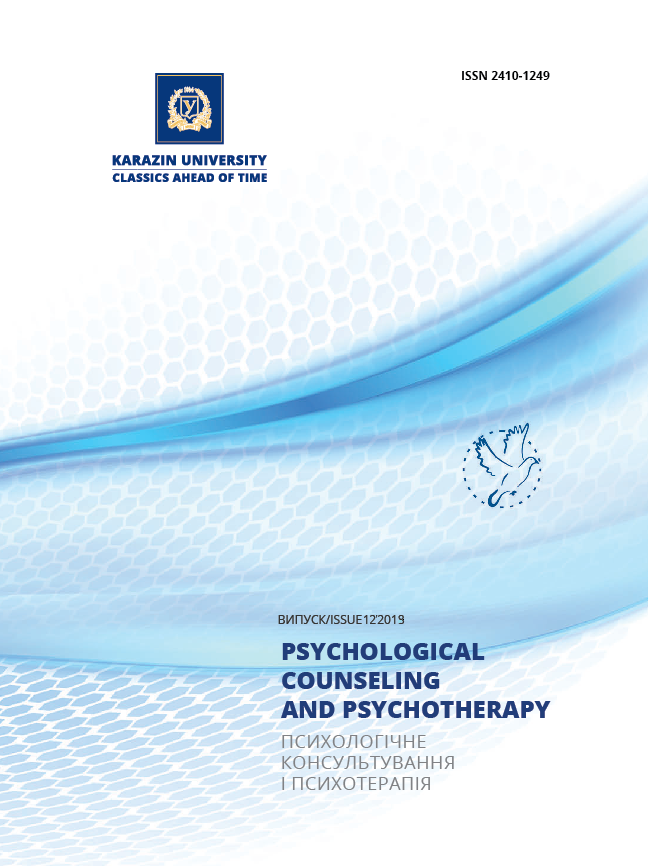Structural Features for Cognitive Representations of Traumatic Emotional Experience Among Demobilized Combatants in Ukraine with Post-Stress Psychological Disadaptation
Abstract
Problem definition In the scientific literature, there is a certain polyparametric nature of approaches to treating PPD (post-stress psychological desadaptation) in military personnel, which adds to the difficulty of dealing with their complaints and is complicated by resistance to therapeutic work with PPD. Also described (Yermoshin AF, Kocharian AS) some features of traumatic experience of personality, namely traumatic experiences: their somatization, fragmentation, cyclicity, etc. The cognitive component of traumatic experience, which is manifested in PTSD in military personnel, remains insufficiently disclosed. Problem analysis The results of both theoretical and practical studies that have attempted to determine the features of cognitive representations of traumatic experiences of military personnel are fragmentary in nature. The concept of "emotional sphere" proposed by Elliott R. and Greenberg L. includes the cognitive component, as one of the basic parts of traumatic personality experience, which can be used to conceptualize in the study of the traumatic experience of servicemen. The purpose of the study Тo determine structural features of cognitive representations of traumatic experience in Soldiers with PPD. Description of the sample The sample consists of two groups. The first group included middle-aged men who had served in the ATO area and were demobilized in the amount of 100 people. The second group is identical in terms of the above characteristics, but these are those servicemen who have Mississippi scale scores that correspond to the severity of the PDD. Conclusions: Demobilized PPD combatants exhibited a pronounced expression of all cognitive representations of traumatic experiences that are substantially closer to the themes of abandonment, humiliation, and injustice, at a significantly higher level than those demobilized without PPD. expressiveness of cognitive representations on the topics of trauma of abandonment, humiliation and injustice in the interaction of which revealed the phenomenon of "wrecking", do not contribute to the occurrence of PPD, unless potentiated by appropriate infantile traumatization.
Downloads
References
Kocharyan A.S. Perezhyvanye kak myshenʹ klyent-tsentryrovannoy psykhoterapyy / A.S. Kocharyan // Kharchenko A.O. (2017). Особливості психотерапевтичної роботи з травматичним емоційним досвідом комбатантів [Peculiarities of psychotherapeutic work with traumatic emotional experience of combatants]. Psychological Counseling and Psychotherapy. 1(8), 67-73. https://doi.org/10.26565/2410-1249-2017-8-02.
Lauterbach V. (1995). The effectiveness of psychotherapy: criteria and results of evaluation. Psychotherapy: From theory to practice. Proceedings of the 1st Congress of the Russian Psychotherapy Association. - St.-Petersburg, ed. Psychoneurological Institute. Bekhtereva, 28-41.
Kocharyan A.S. (2014). Experience as a target of client-centered psychotherapy. Psychological Counseling and Psychotherapy, 1-2, 24-36.
Kokun О.М., Agayev N.A., Pishko I.O, Lozinska N.S. (2016). Peculiarities of detection of PTSD diagnostic indicators in military personnel due to the influence of extreme factors of combat activity. Problems of extreme and crisis psychology. Collection of scientific works. 20. Kharkiv: NUZUU, 84 - 93.
Kozyra P.V., (2016). Феноменология психологической дезадаптации у сотрудников мвд украины-участников в АТО [Phenomenology of psychological maladaptation among employees of the Ministry of Internal Affairs of Ukraine participating in the ATO], American Scientific Journal. 8. 40-46.
Kozyra P.V., (2016). Феноменология психологической дезадаптации у сотрудников мвд украины-участников в АТО [Phenomenology of psychological maladaptation among employees of the Ministry of Internal Affairs of Ukraine participating in the ATO], American Scientific Journal, 8.
Методичні рекомендації. Психолого-психіатрична допомога постраждалим у збройних конфліктах [Guidelines. Psycho-psychiatric assistance to victims of armed conflict]. (2014). Kyyiv: Akademvydav, 34.
Tarabrina N.V., Agarkov V.A., Bykhovets Yu.V., Kalmykova E.S., Makarchuk A.V., Padun M.A., Udachina E.G., Himchan Z.G., Shatalova N.E., Shchepina A.I. (2007). A Practical Guide to the Psychology of Post-Traumatic Stress. Part 1. Theory and methods. - M .: Publishing House "Kogito-Center",. pp. 143-148.
Workshop on the psychology of post-traumatic stress. (2001). St. Petersburg: Peter. 125-136.
Citations
Complex of Suggestions on Improving the Psychological Correction and Diagnostics of Traumatic Emotional Experience Among Military Servants with Post-Stress Psychological Dysaptation
(2020) Psychological Counseling and Psychotherapy
Crossref








